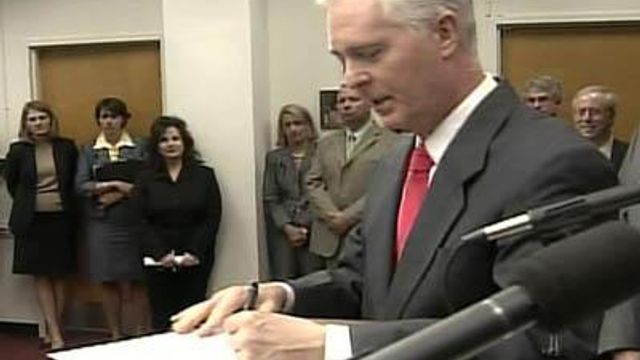Easley signs drought response bill
Although state officials now have more power to respond to droughts, the head of Raleigh's water system says the new law doesn't go far enough.
Posted — Updated"If they don't adopt those restrictions, then fines and penalties start on a daily basis. That allows the governor to go in and target isolated regions of the state," Easley said.
The new law, which takes effect Oct. 1, also gives Easley and future governors power to direct water systems to share their water with other regions without a declared emergency.
The governor had pegged the drought measure as one of his priorities for the legislative session that ended earlier this month. Throughout the fall and winter, he urged people to cut water use amid the worst drought in state history and he repeatedly asked local water systems to take more action to prepare for severe water shortages.
"We've put together the most comprehensive measures that can be taken to preserve our water (and) share water," he said at the signing ceremony. "We have the best drought plan in history, (and) no one else in the region has it."
He said the law is badly needed, citing a new report that shows more North Carolina counties are battling exceptional or extreme droughts this month as compared to one year ago.
The state Drought Management Advisory Council issued its latest report Thursday, showing the eastern half of North Carolina remains in a moderate drought while western counties continue to experience more extreme drought conditions.
Any prolonged dry spell could once again threaten the state's water resources, Easley said.
"I'm as tired as saying that as you are hearing it, but we're still in it and we still have to deal with it," he said.
Raleigh Public Utilities Director Dale Crisp said he supports the state's effort, but said he was hoping the bill would do more to speed up the process of creating new reservoirs and building treatment plants.
"The biggest disappointment with this bill (is) it doesn't supply assistance in developing new sources," Crisp said. "The best plan in the world is not any good if you can't implement it, (and the) process in place now makes it very difficult to develop water supply sources."
Raleigh Mayor Charles Meeker dismissed the notion that local officials might bristle at the increased state powers, saying any measures that help respond to a drought would only benefit local governments.
• Credits
Copyright 2024 by WRAL.com and the Associated Press. All rights reserved. This material may not be published, broadcast, rewritten or redistributed.





